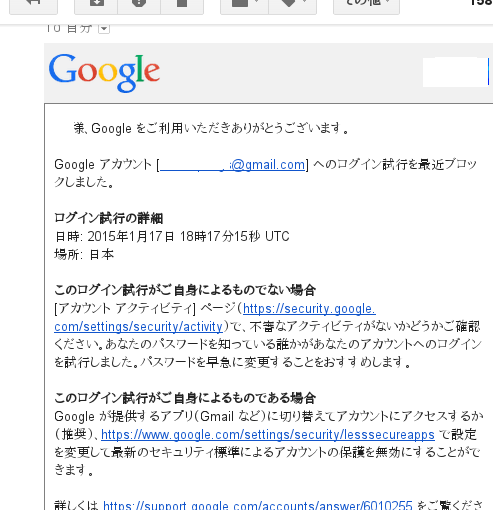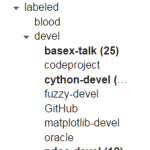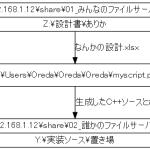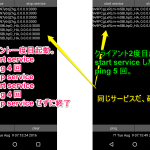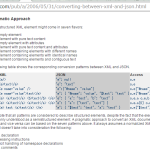「出来るよ」てことを紹介したいわけでもなくて。
結構どうしたもんかなぁ、と言う話であって。スクリプトは例えばこんななの:
send.py
1 import smtplib
2 import mimetypes
3 from email.mime.base import MIMEBase
4 from email import encoders
5 from email.MIMEText import MIMEText
6 from email.MIMEImage import MIMEImage
7 from email.MIMEMultipart import MIMEMultipart
8 from email.Header import Header
9 from email.Utils import formatdate
10 import glob, time, sys, os
11 import logging
12 import shutil
13 import getpass
14
15 your_gmail_account = 'hogeehageehigee@gmail.com'
16 sendto_addr = 'harahire@horohire.net'
17 yourpassword = getpass.getpass("password for %s? " % your_gmail_account)
18
19 def send_via_gmail(msg):
20 s = smtplib.SMTP('smtp.gmail.com', 587)
21 s.ehlo()
22 s.starttls()
23 s.ehlo()
24 s.login(your_gmail_account, yourpassword)
25 s.sendmail(your_gmail_account, [sendto_addr], msg.as_string())
26 s.close()
27
28 def create_message(archive_basename_desired, encoding='utf-8'):
29 outer = MIMEMultipart()
30 outer['Subject'] = Header(archive_basename_desired, encoding)
31 outer['From'] = your_gmail_account
32 outer['To'] = sendto_addr
33 content = MIMEText(archive_basename_desired, 'plain', encoding)
34 outer.attach(content)
35
36 path = archive_basename_desired
37
38 if path:
39 # Guess the content type based on the file's extension. Encoding
40 # will be ignored, although we should check for simple things like
41 # gzip'd or compressed files.
42 ctype, encoding = mimetypes.guess_type(path)
43 if ctype is None or encoding is not None:
44 # No guess could be made, or the file is encoded (compressed), so
45 # use a generic bag-of-bits type.
46 ctype = 'application/octet-stream'
47 maintype, subtype = ctype.split('/', 1)
48 if maintype == 'text':
49 fp = open(path)
50 # Note: we should handle calculating the charset
51 msg = MIMEText(fp.read(), _subtype=subtype)
52 fp.close()
53 elif maintype == 'image':
54 fp = open(path, 'rb')
55 msg = MIMEImage(fp.read(), _subtype=subtype)
56 fp.close()
57 elif maintype == 'audio':
58 fp = open(path, 'rb')
59 msg = MIMEAudio(fp.read(), _subtype=subtype)
60 fp.close()
61 else:
62 fp = open(path, 'rb')
63 msg = MIMEBase(maintype, subtype)
64 msg.set_payload(fp.read())
65 fp.close()
66 # Encode the payload using Base64
67 encoders.encode_base64(msg)
68 # Set the filename parameter
69 msg.add_header('Content-Disposition', 'attachment', filename=path)
70 outer.attach(msg)
71
72 if not os.path.exists("__DONE"):
73 os.mkdir("__DONE")
74 shutil.move(path, "__DONE")
75
76 return outer
77
78 import time, sys, os
79 if __name__ == '__main__':
80 pattern = sys.argv[1]
81
82 FORMAT = '%(levelname)-5s - %(asctime)-15s | %(message)s | - %(funcName)s'
83 logging.basicConfig(stream=sys.stderr, level=logging.INFO, format=FORMAT)
84
85 target_files = sorted(list(glob.glob(pattern)))
86 for i, fn in enumerate(target_files):
87 if i > 0:
88 time.sleep(10)
89 if not os.path.exists(fn):
90 continue
91 logging.info("send '%s'..." % fn)
92 m = create_message(fn)
93 try:
94 send_via_gmail(m)
95 except:
96 time.sleep(20)
97 try:
98 send_via_gmail(m)
99 except:
100 time.sleep(40)
101 send_via_gmail(m)
102 logging.info("send '%s' done." % fn)
このスクリプトの場合は、
1 me@host: ~$ python send.py 'abc.zip_a*'
みたいにすれば、複数のバイナリファイルを添付ファイルにして送信する…のだけれど。
なんというかこれはもはや「お勧めです!」と言えるようなもんではなくなっていて。
この制約を回避するには上のエラーメールの指示に従って、こうね:
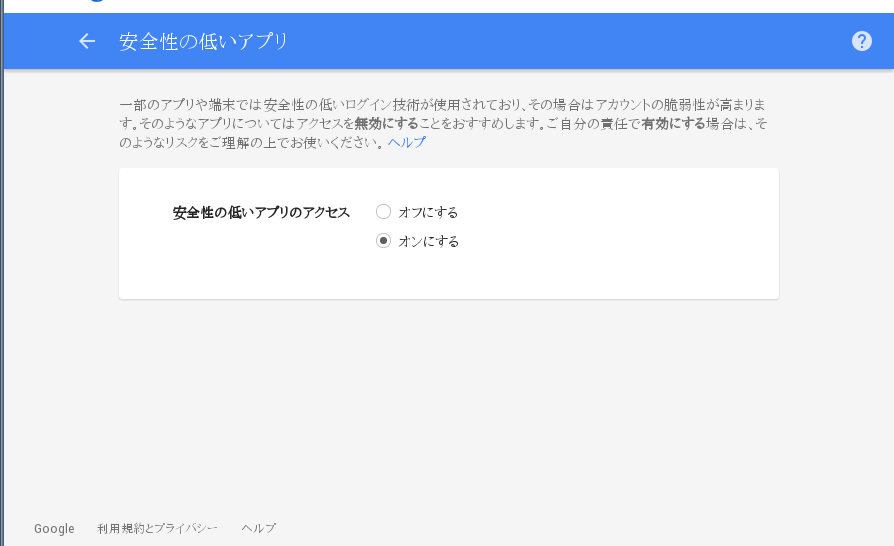
つまりは「正規の API を使わざるもの人にあらず」という、まぁ正論ですね。
なんつぅか他人が作るものに対してこうやってガードが固くなるのは喜ばしいことなんだけれど、それによって自分が日常使うものに影響するのは面倒だなぁ、と。
